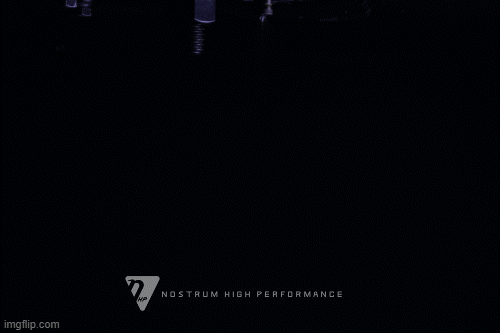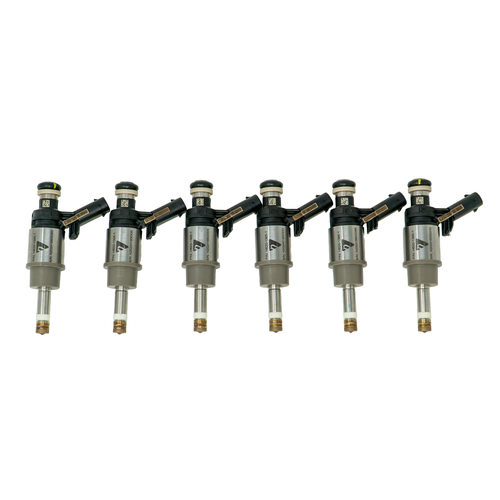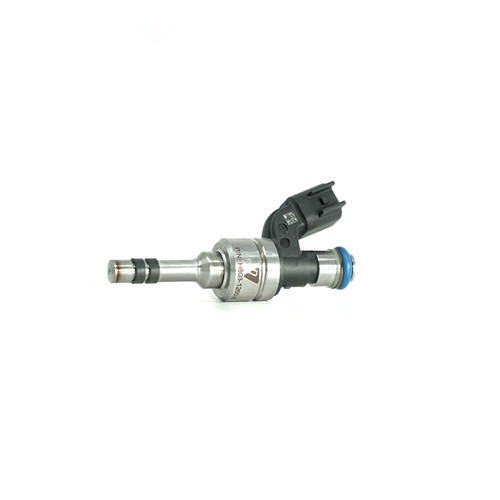This is a no brainer for EA837 owners: A 15% increase in injector flow rate at OE stock replacement price! Increase that injector head room to get the most out of pump E85 performance!
What sets Nostrum apart:
- 15% Larger than stock 3.0L Supercharged v6 Continental injector
- Direct Replacement, no harness or spacers required, (replace with Bosch HDEV5 injector)
- Ethanol Compatible
- OEM compatible spray pattern
- Every injector is tested statically and dynamically to ensure best quality product and set batching
- All sets are batched dynamically within +/-3% variation, automated leak test (gross leak, fine tip leak, and leak decay), max pressure tested - every injector is serialized for complete data and history traceability
- Includes comprehensive installation guide
- Tuning guide available for tuners and installers
Finally! After 7 months of in-vehicle testing and mileage accumulation, NHP has released a high flow fuel injector set for the ubiquitous supercharged 3.0L EA837 v6 (CAJA/CCAA engine codes validated)!! They flow 15% more than the stock Continental DI injector with excellent min pulse width capability and a 180 bar operating pressure rating. These are direct replacement injectors, based on our very successful and durable HDEV5 injector family.
Inside the box, you will find everything you need to get your new injectors installed quickly, including detailed installation instructions. When you are ready to tune, we have injector tuning data available for your dealer or tuner. Being that everything is installed like a factory part, there’s no need to worry about secondary injection controllers, filling meth tanks, clogged meth injectors, or any of the other complex solutions people use to squeeze more power out of these vehicles. Additionally, these injectors are operating with all the OEM ECU’s engine management system diagnostics and safety functions – resulting in a much happier and responsive system!
Take full advantage of your NHP EA837 injectors by bundling up! The EA837 bundle (H186-2049) includes our upgraded high pressure fuel pump (H136-0897), flowing 33% more fuel than the stock pump! That additional fuel flow allows for significant torque increases earlier in the rev range, which really helps that supercharged come alive, and provide the injectors with all the fuel they need to make more peak horsepower, when properly tuned.
Every Nostrum manufactured part is backed by a limited lifetime warranty. Our products are comprehensive solutions that come complete with everything you need inside the box, including detailed installation instructions. Tuning guides are also available for your dealer or tuner. We have customer service and calibration engineers on staff to provide you with any support that you may need, from installation to tuning.
- 2009-2017 Audi B8 Q5
- 2014-2017 Audi B8 SQ5
- 2007-2015 Audi 4L Q7
- 2009-2016 Audi B8 S4/S5
- 2005-2011 Audi C6 C7 A6
- 2012-2018 C7 A7
- Interchange: 06E906036AC, 06E906036K, 06E906036P, 06E906036AL,
Dyno graph sponsorship results:
- Q: Can I use this injector in my later model supercharged 3.0T EA837-EVO model engine?
A: This part number has not been validated or integrated into the EA837 EVO engine. All development and mileage accumulation has been done on the EA837 engine in a 2013 Audi Q5.
- Q: Why do your numbers say I will make less horsepower on E85 than 93 octane?
A: Great question! The numbers we list in the product descriptions are similar to the numbers a turbo charger lists for air flow. The numbers are the "fuel system capacity to generate power" regardless of the other engine system limitations (air handling, mechanical limitations, knock propensity). Essentially the numbers are calculated assuming "sufficiently large air flow", "sufficiently capable mechanical assemblies" and disregarding knock limits. The equation uses actual observed engine volumetric efficiency (when available from sponsorship vehicles) and fuel capacity (including target pressures) to calculate power. Gasoline has more energy per mass volume than E85. So the higher fuel flow capacity will mathematically generate higher power potential for a gasoline than a high ethanol content fuel. The other variables (air flow, spark, rotating assembly strength, charge cooling, mechanical assembly strength) are highly variable from build to build. This is why we state horsepower capacity for the fuel system – representing the potential of the fuel system if you have all the other aspects of your build addressed!




























